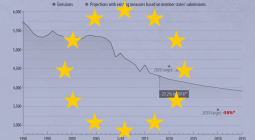EU countries hold first exchange on 2040 climate target
Several EU countries have expressed support for plans to target a 90% emissions cut relative to 1990 levels by 2040, and while Hungary is sceptical, France and Germany have yet to take a stance.
The European Commission is due to publish the EU’s climate target plan for 2040 in a proposal due on 6 February.
While the bloc has already committed to reduce emissions by at least 55% relative to 1990 levels by 2030 and reach net zero by 2050, the intermediate target will be the EU executive’s climate “legacy,” activists have said.
The EU’s 27 environment ministers gathered in Brussels on 15 January to hold a first exchange on the issue and weigh on the Commission’s decision.
Wopke Hoekstra, the EU’s Climate Commissioner, has already made clear that he “will defend a minimum target of at least 90% net reduction by 2040,” in line with the advice from the European Scientific Advisory Board on Climate Change, which recommended a 90-95% range.
“There is no alternative than to respect the red lines of the planet,” Hoekstra said as he walked into the Brussels meeting.
Yet, the Dutchman added that it would be “tremendously important going forward” to balance industrial competitiveness with climate action.
The above 90% coalition
Once the Commission puts forward its proposal, the regular EU lawmaking procedure will begin, involving the European Parliament and the Council of EU member states, which usually takes up to two years.
In this regard, several EU countries have offered support for the 90% goal, starting with Denmark, which already expressed its position in December.
The new Polish government initially seemed to offer its support as well, through the voice of its state secretary for climate, Urszula Zielińska, who was in Brussels to attend the ministerial meeting.
Zielińska arrived at the meeting saying Europe needs “to embrace the 90% reduction emission reduction target” defended by Hoekstra. But she later rowed back, saying this “does not mean that we already have a clear declaration on the emission reduction target for 2040 at such an early stage.”
Bulgaria also offered support. “We must discuss ambitious targets for 2040 at over 90% reduction,” said Julian Popov, the country’s environment minister. Such an ambitious “target will definitely increase Europe’s competitiveness,” he added.
Ireland’s Eamon Ryan drew on last year’s climate conference in Dubai, urging Europe “to seek higher ambition, to learn how we adapt and how we deliver a just transition, and also how we provide the financing we’re going to need to make this happen.”
Alongside Ireland, Finland, Sweden, Luxembourg, the Netherlands, and Spain often cooperate in climate matters – they are all members of the global “High Ambition Coalition” founded in 2014.
The sceptics
Hungary, which will hold the EU’s rotating Council presidency after Belgium’s current six-month stint, did not throw its weight behind the 90% target defended by the EU’s Climate Commissioner.
“We would like to see the proposal,” said Anikó Raisz, minister of state for environmental affairs, insisting that “national specificities have to be taken into consideration.”
The landlocked country, which receives more than 80% of its gas from Russia, is bound to a long-term contract with the Kremlin until at least 2036.
Raiz said her country “would like to see realistic and achievable targets for 2040.” Other EU countries known for not being climate champions, like Italy and Malta, have yet to signal their preferences.
The careful heavyweights
Germany and France, the EU’s two biggest countries, have yet to adopt a position as well.
In Brussels, high-ranking public official Sven Giegold said the “federal government has yet to adopt a definitive position”. However, the former green EU lawmaker noted that a landmark constitutional judgement by the German top court in 2021 demanded that the country reduce emissions by 91% by 2040.
“This is also the benchmark for the European target,” he explained, slamming the media for suggesting that EU countries determine the proposals made by the Commission. “I don’t believe in acting as if the pace is already set by the large member states,” he said.
France, which recently underwent a government reshuffle, has not communicated its recommendation either.
However, Paris does insist that nuclear is recognised in the text, with the adoption of a “low-carbon” energy goal for 2040 as an alternative to the EU’s current “renewable energy” target.
Cover photo: EU countries are starting to take their positions ahead of the European Commission proposing a 2040 climate target for the bloc. [EPA-EFE/OLIVIER MATTHYS]




